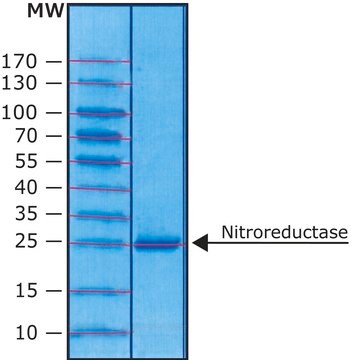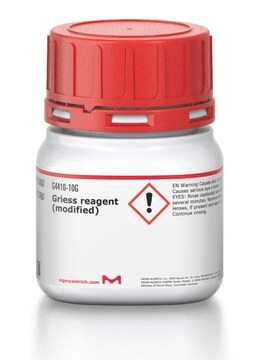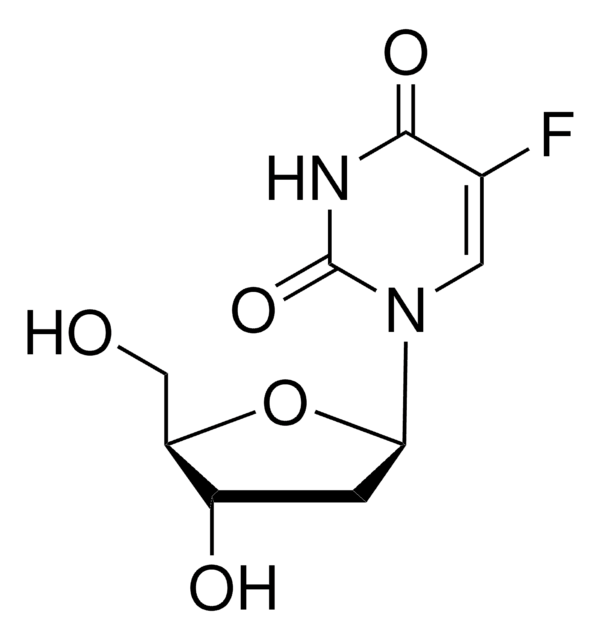N7265
Nitrate Reductase (NAD[P]H) from Aspergillus niger
lyophilized powder, ≥300 units/g solid
Synonym(s):
NAD(P)H:Nitrate oxidoreductase
Sign Into View Organizational & Contract Pricing
All Photos(1)
About This Item
CAS Number:
MDL number:
UNSPSC Code:
12352204
NACRES:
NA.54
Recommended Products
form
lyophilized powder
Quality Level
specific activity
≥300 units/g solid
shipped in
wet ice
storage temp.
−20°C
Looking for similar products? Visit Product Comparison Guide
General description
Nitrate reductase (NAD[P]H) is expressed in variety of organisms including bacteria, fungi, algae, and higher plants which have capacity to use nitrate as their sole source of nitrogen.Experimental studies show that nitrate reductase (NAD[P]H) is 180,000Daltons.
Biochem/physiol Actions
Nitrate Reductase (NAD[P]H) catalyzes the reduction of nitrate to nitrite. In addition, it also catalyzes the reduction of NADPH-cytochrome c, FADH2-nitrate. Nitrate reductase also has reduced methyl viologen-nitrate reductase activities.
Caution
light and moisture sensitive
Unit Definition
One unit will reduce 1.0 μmole of nitrate per min in the presence of β-NADPH at pH 7.5 at 25 °C.
Signal Word
Danger
Hazard Statements
Precautionary Statements
Hazard Classifications
Resp. Sens. 1
Storage Class Code
11 - Combustible Solids
WGK
WGK 3
Flash Point(F)
Not applicable
Flash Point(C)
Not applicable
Personal Protective Equipment
dust mask type N95 (US), Eyeshields, Gloves
Choose from one of the most recent versions:
Already Own This Product?
Find documentation for the products that you have recently purchased in the Document Library.
Customers Also Viewed
G Unden et al.
Molecular microbiology, 25(2), 205-210 (1997-07-01)
The FNR (fumarate and nitrate reductase regulation) protein of Escherichia coli is an oxygen-responsive transcriptional regulator required for the switch from aerobic to anaerobic metabolism. In the absence of oxygen, FNR changes from the inactive to the active state. The
R C Chiang et al.
Molecular microbiology, 24(5), 1049-1060 (1997-06-01)
The Escherichia coli NarX, NarQ, NarL and NarP proteins comprise a two-component regulatory system that controls the expression of many anaerobic electron-transport and fermentation-related genes in response to nitrate and nitrite. Either of the two sensor-transmitter proteins, NarX and NarQ
W H Campbell
Cellular and molecular life sciences : CMLS, 58(2), 194-204 (2001-04-06)
Pyridine nucleotide-dependent nitrate reductases (NRs; EC 1.6.6.1-3) are molybdenum-containing enzymes found in eukaryotic organisms which assimilate nitrate. NR is a homodimer with an approximately 100 kDa polypeptide which folds into stable domains housing each of the enzyme's redox cofactors--FAD, heme-Fe
Purification and properties of assimilatory nitrate reductase [NAD(P)H] from Ankistrodesmus braunii.
M A de la Rosa et al.
European journal of biochemistry, 106(1), 249-256 (1980-05-01)
Assimilatory nitrate reductase [NAD(P)H] (EC 1.6.6.2) from Ankistrodesmus braunii has been purified to homogeneity by a simple procedure that utilizes as the main step affinity chromatography on Blue-Sepharose. The best enzyme preparation has a specific activity of 61.25 units/mg protein.
J Miyazaki et al.
Molecular & general genetics : MGG, 228(3), 329-334 (1991-09-01)
Barley (Hordeum vulgare L.) has both NADH-specific and NAD(P)H-bispecific nitrate reductases. Genomic and cDNA clones of the NADH nitrate reductase have been sequenced. In this study, a genomic clone (pMJ4.1) of a second type of nitrate reductase was isolated from
Our team of scientists has experience in all areas of research including Life Science, Material Science, Chemical Synthesis, Chromatography, Analytical and many others.
Contact Technical Service


![Nitrate Reductase (NAD[P]H) From Pichia Pastoris, recombinant freeze-dried protein glass](/deepweb/assets/sigmaaldrich/product/images/859/572/ae8d80df-c6d0-4cce-a526-35f8e21ca729/640/ae8d80df-c6d0-4cce-a526-35f8e21ca729.jpg)







